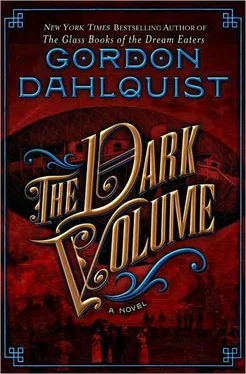Gordon Dahlquist - The Dark Volume
Здесь есть возможность читать онлайн «Gordon Dahlquist - The Dark Volume» весь текст электронной книги совершенно бесплатно (целиком полную версию без сокращений). В некоторых случаях можно слушать аудио, скачать через торрент в формате fb2 и присутствует краткое содержание. Город: New York, Год выпуска: 2009, ISBN: 2009, Издательство: Bantam Books, Жанр: Прочие приключения, на английском языке. Описание произведения, (предисловие) а так же отзывы посетителей доступны на портале библиотеки ЛибКат.
- Название:The Dark Volume
- Автор:
- Издательство:Bantam Books
- Жанр:
- Год:2009
- Город:New York
- ISBN:978-0-553-90603-5
- Рейтинг книги:3 / 5. Голосов: 1
-
Избранное:Добавить в избранное
- Отзывы:
-
Ваша оценка:
- 60
- 1
- 2
- 3
- 4
- 5
The Dark Volume: краткое содержание, описание и аннотация
Предлагаем к чтению аннотацию, описание, краткое содержание или предисловие (зависит от того, что написал сам автор книги «The Dark Volume»). Если вы не нашли необходимую информацию о книге — напишите в комментариях, мы постараемся отыскать её.
The Dark Volume — читать онлайн бесплатно полную книгу (весь текст) целиком
Ниже представлен текст книги, разбитый по страницам. Система сохранения места последней прочитанной страницы, позволяет с удобством читать онлайн бесплатно книгу «The Dark Volume», без необходимости каждый раз заново искать на чём Вы остановились. Поставьте закладку, и сможете в любой момент перейти на страницу, на которой закончили чтение.
Интервал:
Закладка:
“Of course—Celeste—”
“Which brings me to ask, as it was impossible to do so downstairs, whether in your search you glimpsed any other figure in the village streets?”
“Was there someone we ought to have seen?”
Miss Temple shrugged. Elöise watched her closely, obviously on the point of apologizing once more. Miss Temple smiled as graciously as she could.
“It is only this morning that I have been from my bed. Suddenly I should like nothing more than to shut my eyes.”
“Of course. I will tell Mrs. Daube that we shall be some minutes more—you must take all the time you like.”
“That is most kind,” said Miss Temple. “If you would take the lantern with you and close the door.”
AS SHE lay in the dark, facing the pine plank wall, holding Chang's volume of poetry between her hands, Miss Temple told herself that in all truth it was simpler this way—and who knew, perhaps Elöise's quarrel with Doctor Svenson had been similarly impulsive and shortsighted, the outburst of an unreliable, skittish woman who had, quite frankly, always been something of a bother. She took in a deep breath and let it out slowly, feeling a catch in her throat. Nothing was changed—apart from it being that much more important to get back to the city. If she slept on the train, there would be no need to speak to Elöise at all, apart from the sorting of tickets—and no reason to visit her family's cottage either. Miss Temple could find a new hotel. Chang and Svenson could seek her out there. If they were alive.
She sighed again, then sat up in an abrupt rustle of petticoats, fumbling for a candle and a match. She did not want to think about Elöise, nor the disfigured, corpse-white face in the window, nor her visions from the glass book, nor the Contessa, nor Roger. She didn't want to think about anything. Miss Temple looked down at the book in her hand, and leaned closer to the light.
She was never one for poetry or, if it must be said, reading in particular. It was an activity most often undertaken at the behest of someone else—a governess, a tutor, some relative—and so a source of resentment and disdain. Yet Miss Temple imagined Chang must feel about poetry the same way she felt about maps, maps being the one sort of reading she could happily essay. She opened the book and began to flip the pages, gauging the amount of text per page (not very much) and the number of pages in all (not very many)—an easy sort of read that would have appealed to her impatience save that this sparsity gave off at the same time an unwelcome whiff of pride.
She closed the book, and then on an impulse opened both covers at the same time, allowing the pages to open on a random poem. The one that fell to view did so because the binding had been repeatedly doubled back, and the page's corner deliberately folded down to mark its place.
It bore but one simple stanza, titled “Pomegranate”:
Six blood-swept seeds, consumed in grief
A dismal realm of fetid torp'rous air
No sky above her for relief
Compacted with damnation, beyond care
Miss Temple closed the book. She was not against poetry as a rule—the idea of its density even appealed to her. Yet to Miss Temple this meant nothing written , but knotted, sensual experiences she could not imagine bound into mere words—moments too unwieldy, too crammed with what shivered her bare spine: the rage of a September surf, the snarl of her sweet cat upon catching a bird, the smoke of burning cane fields drifting across her morning veranda… distilled instants in which she perceived some larger inkling of the hidden world… moments that left her feeling both wiser and bereft.
If she concentrated she could of course recall the legend of Persephone, or enough of it to make her sigh with impatience, but she did not know what kidnapping, pomegranates, and so forth meant to Chang. That the binding had been bent and the page folded spoke to the poem's significance in his mind. She did take a certain pleasure at “blood-swept” and appreciated the hopelessness of a realm lacking a sky, as one supposed an underworld must. But as to the poem's subject , a Princess taken into the underworld… Miss Temple sniffed, supposing it must refer to Chang's courtesan love, Angelique. She pursed her lips to recall the regrettable whore who, like a foolish girl in a fairy tale, had rejected Chang in favor of vain promises from the Comte d'Orkancz—a choice that had led to Angelique's enslavement, disfigurement, and death. Such things of course happened—a great many unwelcome men had cared for Miss Temple any number of times— and yet it seemed that the Cardinal, who was so able , ought to have been immune to so common an affliction. And yet, far from spurring a dislike of Chang for this failing, Miss Temple found herself sighing in unexpected sympathy for his pain.
SHE SIGHED again, looking into the candle flame. A sensible course would have been to go downstairs, eat a good meal, and then sleep through to the morning. But her thoughts were still too restless (nor was she especially looking forward to sharing a bed with Elöise). It occurred to her that the other guest, the hunter, Mr. Olsteen, must have used a local horse for his hunting. Perhaps he could answer some of the questions she would have put to the murdered groom…
Miss Temple tucked the book under the pillow and blew out the candle. She stepped onto the landing and again straightened her dress, wondering if Mrs. Daube might be prevailed upon in the morning to curl her hair, a thought that quite unbidden brought a smile to her face. She descended the stairs breathing in the smells of food and a crackling fire, the hardening of her heart so normal a sensation as to be but scarcely noticed.
MISS TEMPLE found Mrs. Daube in the kitchen, pouring a very dark gravy from a pan on her stove into a small pewter cruet. The innkeeper had set a modest table with two places. But Elöise was not there. Mrs. Daube looked up at Miss Temple, her eyes kind and bright.
“There you are! The other lady said you were resting, but I am sure a hot supper will do you nicely.”
“Where is Mrs. Dujong?”
“Is she not by the fire?”
“No.”
“Then I'm sure I do not know. Perhaps she is speaking to Mr. Olsteen.”
“Why would she be doing that?” asked Miss Temple.
“Perhaps to apologize for his needless searching for you?” said Mrs. Daube with a smile, as she placed a bowl of steaming vegetables onto the table, next to a brown loaf dusted with flour.
“Where would she be?” asked Miss Temple. “They are not upstairs.”
“Will you sit?” asked Mrs. Daube. “It is much better eaten when ready.”
Miss Temple hesitated, both annoyed and relieved at Elöise's absence, but then she considered that time with Mrs. Daube was an opportunity of its own. She slipped past with a trim smile to a chair on the table's far side, where she could speak to the innkeeper without turning.
“Here you go.” Mrs. Daube set a meager chop on a heavy Dutch blue plate before her. “The end of last week's mutton. I make no apologies, for you'll get no better in Karthe. There have been no stores come north these last five days—as if we have not the needs of finer folk. One vexation after another. I am not sure I ever got your name.”
“I am Miss Temple.”
“I am poor with names,” said Mrs. Daube, tartly. “It is good I am an excellent cook.”
Miss Temple occupied herself with the pewter cruet, the bread, and a wooden bowl of what looked like mashed turnips with some scrapings of nutmeg—a grace note that indeed bettered her opinion of her hostess.
“I believe you have recently seen a friend of Mrs. Dujong and myself,” Miss Temple observed, pasting a smear of butter across her slice of bread. “A rather daunting person, in a red coat and dark glasses?”
Читать дальшеИнтервал:
Закладка:
Похожие книги на «The Dark Volume»
Представляем Вашему вниманию похожие книги на «The Dark Volume» списком для выбора. Мы отобрали схожую по названию и смыслу литературу в надежде предоставить читателям больше вариантов отыскать новые, интересные, ещё непрочитанные произведения.
Обсуждение, отзывы о книге «The Dark Volume» и просто собственные мнения читателей. Оставьте ваши комментарии, напишите, что Вы думаете о произведении, его смысле или главных героях. Укажите что конкретно понравилось, а что нет, и почему Вы так считаете.












